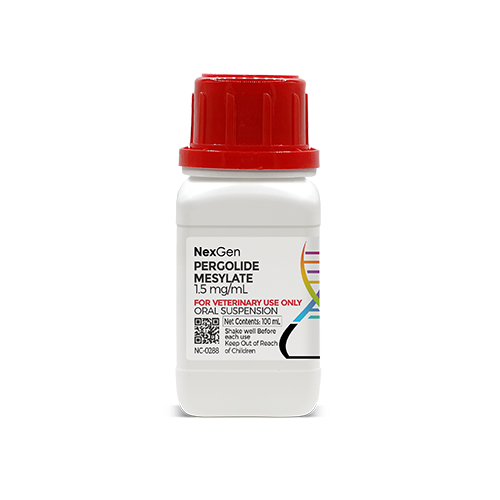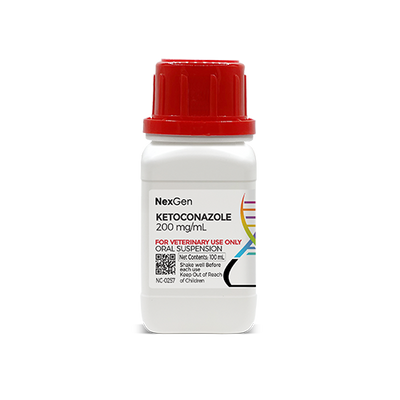
Pergolide Mesylate 1.5 mg/mL, Oral Suspension, (100mL)
Login for pricing
- Brand
- Mixlab
- SKU:
- NC-0288
- Product Type:
- Suspension
- Size:
- 100ml
- Administration:
- Oral
Pituitary pars intermedia dysfunction, also known as Cushing’s Disease, affects hormone production pathways in the brain from the hypothalamus and pituitary glands. The release of hormones from the pituitary gland is normally controlled by the hypothalamus through the neurotransmitter dopamine. In the presence of PPID, the degeneration of neurons that produce dopamine results in an inability to control the hormones produced by the middle lobe of the pituitary gland (pars intermedia). High levels of these hormones affect processes throughout the body. PPID is age-related, typically occurring in horses older than 15 years of age, although horses as young as 7 years of age have reportedly been diagnosed with PPID.2
Pituitary pars intermedia dysfunction and equine metabolic syndrome (EMS; a more recently described syndrome that shares some characteristics with PPID) are often encountered in aging horses and may present with several recognizable signs, including laminitis.3 Diagnoses and treatments for PPID 6and EMS differ, so it is important to have an experienced equine veterinarian diagnose horses suffering from the described symptoms.
Common signs of PPID in horses include:
- Failure to fully shed
- Long, curly coat (often along the jaw line with feathering near the fetlocks)
- Chronic infections
- Repeated occurrences of laminitis with hoof abscesses
- Excess sweating
- Polyuria/polydipsia (PU/PD)
- Lethargy
- Loss of muscle mass (in untreated horses)
- Pot-bellied appearance
- Infertility, or lack of estrus cycles
- Abnormal development of mammary glands
Approximately 30% of horses with PPID also show signs of insulin dysregulation. In these horses, blood insulin levels are high because tissues have a decreased insulin response. Insulin dysregulation is usually indicative of EMS. PPID and EMS can present at the same time in the same horse, so knowledge of a horse’s insulin status is important for assessing laminitis risk and determining dietary management.4
Pergolide for Horses
The prognosis for horses with PPID varies, with some horses responding to a low level of medication and others needing a much higher level. Earlier diagnosis may result in a better quality of life, particularly if negative consequences like infections and laminitis can be avoided.4
Where to buy Pergolide
Pergolide is available in the U.S. through several pharmaceutical manufacturers and through veterinary custom compounding companies.
This product carries minimal potential drug interactions, however it is advisable to consult your veterinarian prior to beginning any treatment regimen.
FOR RX ONLY: A valid prescription from a licensed veterinarian is required for dispensing this medication.
2Durham, A. Endocrine Disease in Aged Horses. Vet Clin North Am Equine Pract. 2016 Aug; 32(2):301-15.
3McFarlane, D. Equine pituitary pars intermedia dysfunction. Vet Clin North Am Equine Pract. 2011 Apr; 27(1):93-113.














